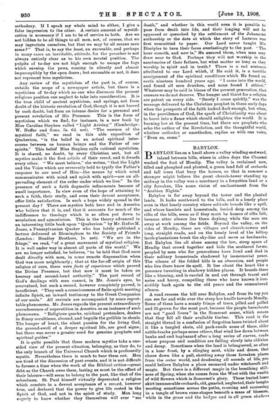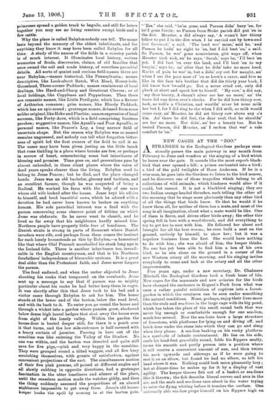BABYLON.
BABYLON lies on a knoll above a valley winding eastward. inland between hills, where in olden days the Channel washed the foot of Mendip. The valley is reclaimed now, tilled and ploughed and planted, a green land full of orchards and tall trees that bury the houses, so that in summer a stranger might believe the great church-tower standing op midway in the valley was a sanctuary in a forgotten land or a city forsaken, like some vision of enchantment from the "Arabian Nights."
Babylon is far away beyond the tower and the planted lands. It looks southward to the hills, and is a lonely place even in that lonely country where solitude broods like a spell, and where hamlets and homesteads, buried deep among the rifts of the hills, seem as if they must be homes of elfin folk, because utter silence lies there daylong while the men are away at work among the fields. Beyond the valley, on the sides of Mendip, there are villages and church-towers and long, straight roads, and on the lonely level of the hilltop larch-plantations break the sky-line and serve as landmarks. But Babylon lies all alone among the low, steep spurs of Mendip that crowd together and hide the scattered farms, peopled by men who for generations have lived and died in their solitary homesteads shadowed by immemorial peace. The silence of the folded hills is an obsession, and people who live there know its spell. It lies about the heart like a presence haunting in shadowy hidden places. It broods there like a blessing, and is carried in and out through travel and noise and hurry, compelling those who have known it irre- sistibly back again to the old peace and the remembered silence.
A road crosses the hill near Babylon, and from its top you can see far and wide over the steep low knolls towards Mendip. Some of these have a scanty fringe of trees, pilled and polled and ill-grown for the most part, because the people hereabouts are not "good livers" in the Somerset sense, which means that they fell all their available timber. This road is the straight thread in a confusion of forgotten lanes twisted about it like a tangled skein, old pack-roads some of them, older cattle-tracks perhaps some others, that wind low down between banks and end haphazard after a long series of carves, roads whose purpose and condition are falling slowly into oblivion and decay. Sometimes when the land is beleaguered, as often in a hoar frost, by a clinging mist, white and dense, that closes down like a pall, shutting away these forsaken places from the outer world, and deadening all sounds of life, you could believe Babylon a place ensnared under witchcraft and magic. But there is a different magic in the breathing still- ness of Spring, when she comes from the West with the wealth of wild flowers which is Somerset's glory. These buried lanes skirt innumerable orchards, old, gnarled, neglected, their boughs meeting sometimes across the paths, crossing and recrossing in a tangle of brown rune-shapes beneath a mass of blossom, while in the grass and the hedges and in all green shadows primroses spread a golden track to beguile, and still for hours together you may see no living creature except birds and a few cattle.
Why the place is called Babylon nobody can tell. The name lasts beyond the memory of the oldest inhabitants, and for anything they know it may have been called Babylon for all time. A study of the names of the fields in a country parish is of much interest. It illuminatea local history, revives memories of feuds, discoveries, claims, of old families that once owned the soil and made history, of countless parochial details. All sorts of quaint and curious field-names there are near Babylon,—names historical, like Pennsylvania; names descriptive, like Look-about Batch, Wet Mead, Honey-hole, Gooseland, Three-corner Paddock ; names reminiscent of local dealings, like Hard-and-Sharp and Greatcoat Cleeves ; or of local holdings, like Copylease and Pepperlease. Then there are romantic names, like Little Perdigate, which has a flavour of Arthurian romance; grim names, like Bloody Paddock, which has an epic sound ; grotesque names, debased from some nobler original, like Hoke and Pinchin ; names expressive of local sarcasm, like Forty-Acre, which is a field comprising fourteen perches; suggestive names, like Apsall's and Poor Apsall's; or personal names, like Pearce's Leg, a long narrow field of uncertain shape. But the reason why Babylon was so named remains unguessed, and nobody can tell what forgotten bitter- ness of spirit led the first owners of the field to call it so. The name may have been given jesting on the little brook that runs tinkling in a place where brooks are few, or perhaps in sorrow of heart, remembering some lost inheritance of blessing and promise. Time goes on, and generations pass by almost unheeded, in these silent places where the voice of dead years speaks clearer than the living. Babylon used to belong to Jesse Pearce ; but he died, and the place changed hands.. Jesselvas an old bachelor, gloomy and taciturn, and an excellent farmer, though he was suspected of being a Radical. He worked his farm with the help of one man whose old wife looked after the house. Jesse kept his affairs to himself, and bred beautiful cows, which he adored with a devotion he had never been known to bestow on anything human. His sole parochial interest was a feud with the parson concerning some obscure point of tithing on which .Jesse was obdurate. So he never went to church, and he lived so far away that his neighbours hardly missed him. Northern people have properly little fear of loneliness. The .Danish strain is strong in parts of Somerset where Danish invaders were rife, and perhaps from them comes the instinct for such lonely homesteads as this by Babylon,—a homestead like that where Olaf Peacock marshalled his stock long ago in the Iceland fells. There is another inheritance too, ineradi- cable in the English countryman, and that is his Northern forefathers' independence of hierarchic systems. It is a great deal older than the Protestant faith, and Jesse never forgave the parson.
The feud endured, and when the rector objected to Jesse shooting his rooks that trespassed on the cornlands, Jesse sent up a message to say that if parson was so mighty particular about his rooks he had better keep them in cages. It was shortly after this that Jesse took to his bed and a visitor came through Babylon to ask for him. The house stands at the lower end of the barton, below the road level, and with its back to it. To enter you go round the house and through a wicket into a garden where pansies grow, shadowed below dense high laurel hedges that abut away the house even from sight of the lonely valley. Within the garden the house-door is buried deeper still, for there is a porch over it that turns, and the low side-entrance is half covered with a heavy curtain of jasmine. Passing in here out of the sunshine was like entering the Valley of the Shadow. No one was within, and the barton was deserted and quite still save for five pigs,—pink and very happy in the sunshine. They were grouped round a tilted waggon, and all five busy scratching themselves, with grunts of satisfaction, against convenient projections of the cart. The simultaneous motion of their five pink persons, all poised at different angles and all slowly rubbing in opposite directions, had a grotesque fascination in the utter loneliness and silence of the place, until the ceaseless motion made the watcher giddy, and then the thing suddenly assumed the proportions of an absurd nightmare impossible to get away from. Jesse's old house- keeper brake the spell by eowiug in at the barton gate. "'Ess," she said, "he'm gone, and Parson didn' bury 'en, for he'd gone furrin ; so Parson from Stoke parish did put 'en in the dirt. Measter, a did always say, A wunn't hey thiccy fellow to put I iu the dirt when I he carried out by town-end feet foremost,' a said. 'The land wer' mine,' said he, and Parson he hada' no right to 'en, but I did best 'en,' a said. So Parson, he wer' gone somewheres, girt ways off, when Measter took sick, an' he says, Sarah,' says he, ' I'll best 'en yet. I did best 'en over the land, and I'll best 'en to my buryinV says lie; an' after that he didn' take no more heed. Racks of pain he wee' in, but a didn' cry out for naught, au when I see the poor nose of 'en so keen's a razor, and him so like in the face to's brother that did die thirty year back, I did know how 'twould go. But a never cried out, only did pluck at sheet and speak low to hisself. My cow,' a did say, my dear beauty, A shaun't niver see her no more,' an' the tears did run down over's cheeks. For he did love thiccy cow, look, so well's a Christian, and wouldn niver let none milk her but I, for I did sing to she when I did milk, so milk would come easy, an' Measter, he did set thiccy cow above any o's kin. An' there he did fret, the dear soul, that he shoulda' see her no more. Nor cliche, an' her a beauty too. But he bested Parson, did Measter, an' I reckon that wer a rale comfort to 'en."







































 Previous page
Previous page